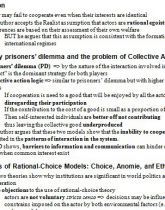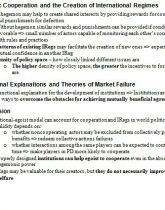Hledej
Zobraz:
Univerzity
Kategorie
Rozšířené vyhledávání
12 663
projektů
Rational-choice and functional explanations
| Přípona .doc |
Typ studijní materiál |
Stažené 0 x |
| Velikost 0,1 MB |
Jazyk anglický |
ID projektu 9386 |
| Poslední úprava 09.01.2017 |
Zobrazeno 1 114 x |
Autor: clean.bandit |
 Sdílej na Facebooku
Sdílej na Facebooku |
||
| Detaily projektu | ||
- Cena:
4 Kreditů - kvalita:
84,4% -
Stáhni
- Přidej na srovnání
- Univerzita:Univerzita Karlova v Praze
- Fakulta:Fakulta sociálních věd
- Kategorie:Humanitní vědy » Politologie
- Předmět:Mezinárodní vztahy
- Studijní obor:-
- Ročník:3. ročník
- Formát:MS Office Word (.doc)
- Rozsah A4:2 stran
Introduction
• Actor may fail to cooperate even when their interests are identical
• The author accepts the Realist assumption that actors are rational egoists => their preferences are based on their assessment of their own welfare
o BUT he argues that this assumption is consistent with the formation of international regimes
Single-Play prisoners’ dilemma and the problem of Collective Action
• Prisoners’ dilemma (PD) => by the nature of the interaction involved in the game, to “defect” is the dominant strategy for both players
• Collective action logic => similar to prisoners’ dilemma but with higher number of actors
• If cooperation is need to a good that will be enjoyed by all the actors disregarding their participation
• If the contribution to the cost of a good is small as a proportion of its total cost
• Then self-interested individuals are better off not contributing
• thus leaving the collective good underproduced
• The author argues that these two models show that the inability to cooperate is inherited in the patterns of interaction in the system.
• As PD shows, barriers to information and communication can hinder cooperation even when common interest exist
• Actor may fail to cooperate even when their interests are identical
• The author accepts the Realist assumption that actors are rational egoists => their preferences are based on their assessment of their own welfare
o BUT he argues that this assumption is consistent with the formation of international regimes
Single-Play prisoners’ dilemma and the problem of Collective Action
• Prisoners’ dilemma (PD) => by the nature of the interaction involved in the game, to “defect” is the dominant strategy for both players
• Collective action logic => similar to prisoners’ dilemma but with higher number of actors
• If cooperation is need to a good that will be enjoyed by all the actors disregarding their participation
• If the contribution to the cost of a good is small as a proportion of its total cost
• Then self-interested individuals are better off not contributing
• thus leaving the collective good underproduced
• The author argues that these two models show that the inability to cooperate is inherited in the patterns of interaction in the system.
• As PD shows, barriers to information and communication can hinder cooperation even when common interest exist
Klíčová slova:
prisoner
rational-choice
collective action
cooperation
theories
explanation
Obsah:
- Introduction
Single-Play prisoners’ dilemma and the problem of Collective Action
Limitations of Rational-Choice Models: Choice, Anomie, anf Ethics
Iterated (repeated) PD and Collective action in small groups
Egoistic Cooperation and the Creation of International Regimes
Functional Explanations and Theories of Market Failure
Conclusion

